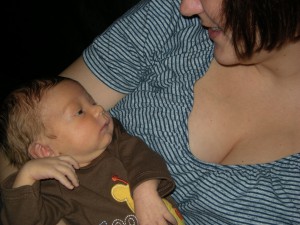 As you know, your milk is a wondrous thing. It is uniquely designed for your baby, changes by the minute and by the day and is the perfect nutrition for your baby no matter what her age. It is also full of antibodies, long-chain fatty acids and protects your baby from illness. It’s always the perfect temperature. It tastes like ice cream. You always have it with you. It’s free! You will never have to worry about a batch of your milk being recalled. Still, as great as your milk is; for your baby, breastfeeding is about much more than the milk. Continue reading
As you know, your milk is a wondrous thing. It is uniquely designed for your baby, changes by the minute and by the day and is the perfect nutrition for your baby no matter what her age. It is also full of antibodies, long-chain fatty acids and protects your baby from illness. It’s always the perfect temperature. It tastes like ice cream. You always have it with you. It’s free! You will never have to worry about a batch of your milk being recalled. Still, as great as your milk is; for your baby, breastfeeding is about much more than the milk. Continue reading
Tag Archives: benefits of breastfeeding
Bones and Breastfeeding
 It’s a commonly held belief that women who breastfeed their babies experience bone loss at a much greater rate than women who do not breastfeed. Not only that, but the longer you breastfeed, the worse the bone loss will be. That, somehow, if we feed our baby in a way that’s biologically normal, there will be devastating consequences to our bodies. It’s never made sense to me that nature’s system for nourishing our young could lead to such devastating consequences as osteoporosis and fragile bones. Continue reading
It’s a commonly held belief that women who breastfeed their babies experience bone loss at a much greater rate than women who do not breastfeed. Not only that, but the longer you breastfeed, the worse the bone loss will be. That, somehow, if we feed our baby in a way that’s biologically normal, there will be devastating consequences to our bodies. It’s never made sense to me that nature’s system for nourishing our young could lead to such devastating consequences as osteoporosis and fragile bones. Continue reading
Breastfeeding and Obesity
You probably already know that childhood obesity has become a serious problem in the United States. But did you know that formula feeding increases the risk that a child will develop obesity later in life? Breastfeeding your baby significantly decreases the chances that he will become overweight as an adult. The Centers for Disease control and Prevention have reported: “…for each month of exclusive breastfeeding, up to 9 months, the risk of obesity is decreased by 4%.” In other words, the longer your baby breastfeeds, the less risk of obesity!
Here is a summary of a few other recent studies: This information is from the “Meds and More Newsletter, by Hale Publishing, December 2012.
Early artificial feeding may increase childhood obesity risk by 15-25%
The research suggests that direct breastfeeding (as opposed to bottle feeding with breast milk) may help a child better regulate his food intake later in life.
Infant weight gain is influenced not only by the type of milk consumed, but the delivery method (breast vs bottle).
Human milk is low in protein compared to other milks and formula which appears to lead to decreased risk of obesity.
Every mother has her own personal reasons for choosing to breastfeed. Maybe it’s because she is concerned about allergies. Perhaps she knows that formula feeding increases the risk of ear infections or other illness. Whatever your reasons for breastfeeding, now you have one more.
So keep breastfeeding! Every month brings new benefits!
For the complete press release: http://www.ibreastfeeding.com/newsletter/2012/12/issue-breastfeeding-and-obesity
